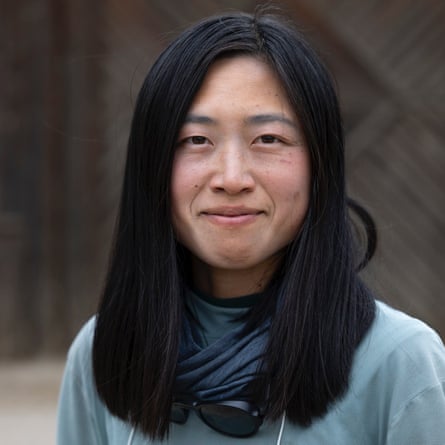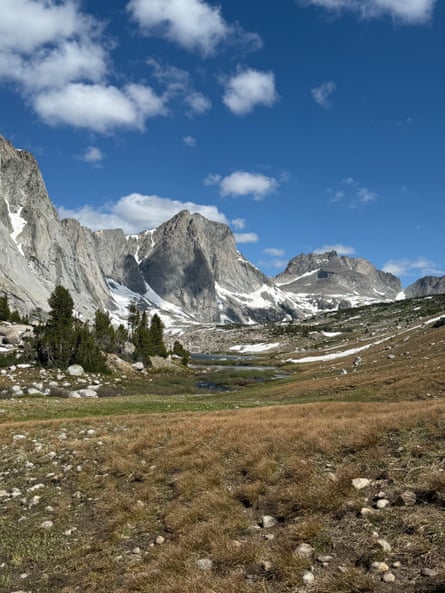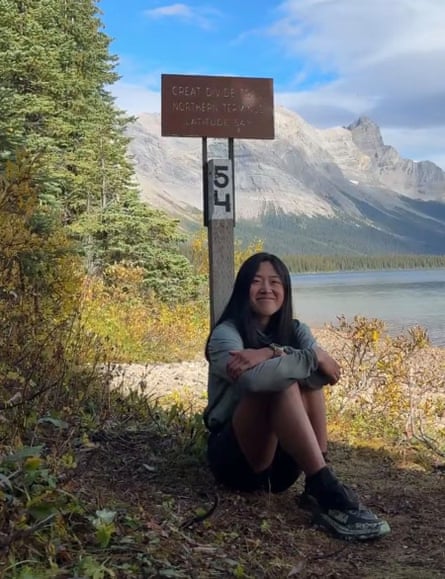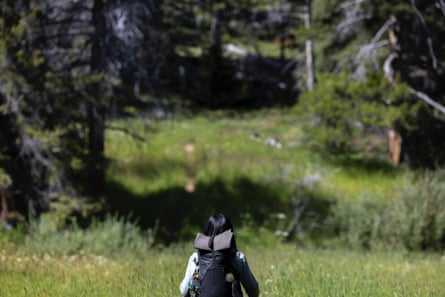Jessica Guo had just two-and-a-half hours of sleep aboard an overnight bus when she arrived at the Mexico-US border close to Lordsburg, New Mexico, in April. Looking out the window, she observed a barren, sun-scorched terrain. Nervousness on her first day left Guo doubting her purpose there.
The previous consultant had stepped away from corporate life to undertake a challenge no woman had achieved: a continuous hike across the Continental Divide Trail (CDT) and the Great Divide Trail (GDT) within a single year.
This uncommon connection between the two trails – which pass through New Mexico’s Chihuahuan Desert, Colorado’s high-altitude crosses, Old Faithful in Yellowstone National Park in Wyoming, the picturesque vistas of Montana and Glacier National Park, and the wild landscapes of Banff, Canada – intrigued tens of thousands of followers online as Guo chronicled and edited her daily adventures, maintaining an average pace of approximately 48km (30 miles) each day.

She finished the remarkable, five-month expedition in September, achieving the milestone of being the first female hiker to accomplish this – and opted to leave her well-paying job permanently to dedicate more time to assisting others in enjoying the trails.
“I didn’t begin as an extreme endurance athlete; I genuinely consider myself an ordinary person,” she remarked about the 5,698km (3,541-mile) trek, only undertaken by three men since 2005. “I was initially anxious about camping outdoors alone in the woods or hiking solo or at night when I first started backpacking nearly a decade ago.”
Her brief, narrated videos, showcasing scenery from arid deserts to snowy summits, were initially intended for family, friends, and fellow hikers. Yet, it didn’t take long for a broader community to engage with them; she now boasts nearly 50,000 followers on her Instagram account. Guo shared updates daily, editing content on the move during more manageable sections of the trail, and would send the files to her brother whenever she could access cell service so he could post them on her behalf.
Guo, who celebrated her 30th birthday on the trail, faced a myriad of challenges including swarms of mosquitoes, thick mud and snow, rocky ridgelines, and dense forests (noticing bears, caribou, and 193 species of birds along her journey) as she ascended 179,450 meters (588,747ft) – equivalent to climbing Everest 20 times.
On September 19, day 152, Guo reached the conclusion of her quest, sharing an emotional video from the isolated Kakwa Lake in the Rocky Mountains of British Columbia, Canada. “If there’s something out there that calls to you, I hope you heed it,” she said. “Grant yourself permission to pursue it.”
‘It’s difficult when you don’t see individuals who resemble you’
Despite being raised in a suburb near Seattle, where she frequently encountered nature during family hiking and camping excursions, it took Guo many years to grant herself the permission to embark on something remarkable.
It was during a crucial trip to Panama after high school, which she funded by selling Girl Scout cookies, that Guo discovered the Pacific Crest Trail (PCT), which stretches along the US border with Mexico to the Canadian border and gained prominence through Cheryl Strayed’s 2012 memoir Wild. She was drawn to the idea of hiking in her home state but felt apprehensive.

“I believe many women often underestimate their potential and feel the need to be overly prepared,” she stated. “I later came to understand that you don’t need to feel entirely ready to chase your ambitions. We’re not conditioned to think that way as women.”
The proportion of women engaging in hiking and backpacking has steadily grown. In 2018, women accounted for one-third of thru-hikers – those who hike a long-distance trail from end to end in one go – but 2024 Appalachian Trail (AT) and PCT surveys indicated that nearly half of all long-distance thru-hikers identified as female. Nonetheless, Guo has faced “benevolent sexism” – men underestimating her abilities or trying to act as guardians – both on the trail and in the comment sections of her posts. Some hikers were surprised to see an Asian woman on the trail, and other Asian hikers have shared with Guo they’ve been mistaken for her.
“I wish for increasing diversity to the extent that it becomes unremarkable,” expressed Guo, the child of Chinese immigrants. “It’s challenging when you don’t notice individuals who resemble you doing things you aspire to do.”
Guo finally realized her decade-long dream of hiking the PCT in 2023. She received her trail nickname, “Stitches,” after suffering a calf injury from a branch, necessitating six stitches, and another incident involving a sharp rock that required three stitches on her knee.
From post-trail depression back to the trail
The thrill of her achievement was fleeting as she soon encountered post-trail depression, followed by severe clinical depression after returning to her regular life as a design strategist and facilitator in a consulting firm. “You transition from a space where you receive daily dopamine from being outdoors and attuned to nature to returning to a job, a 9-to-5 schedule, and a sedentary lifestyle,” she shared. “It’s a drastic change.”

Her physician advised Guo that she needed to return to the trail to rediscover her identity.
Last year, she took a medical leave and hiked the Colorado Trail (CT) in about a month. “That felt incredibly empowering because beforehand I was not eating, sleeping, or engaging in outdoor activities. I wasn’t doing the things that keep you alive and healthy, yet these are also the essentials when you’re on the trail,” she shared. “I must move forward, eat, and rest.”
Observing her progress on the CT assisted Guo in recovering from depression and discovering a new aspiration. That’s when she conceived the idea of linking the CDT and GDT, but realized there was hardly any information available about completing both hikes. She resolved to forge her own route and chronicle it for prospective hikers to follow in her footsteps.
Guo’s CDT and GDT journeys were predominantly lonely, allowing her the space to contemplate and document her experiences, including witnessing the direct impacts of climate change.
In one post, Guo expressed: “I didn’t embark on this hike with the intention of discussing climate, but the impact we’re having is untenable. You might not perceive it at home because you turn the faucet and fresh water flows. Yet here at the source, I observe the glaciers shrinking. There should be a glacier here, but it’s gone. And that terrifies me.”
She also addressed the current dangers to public lands and the roadless rule, which safeguards the US’s backcountry recreational spaces. “The entire essence of being out there is to be in that secluded area,” she remarked, “and I believe it’s worth preserving.”

When Guo viewed the conclusion of the GDT trail, she was engulfed by emotion and began to weep.
“I reflected on how I had traversed the ridgeline of North America, the origin of the water that sustains countless millions across two nations, nourishing countless creatures, plants, and ecosystems,” she recounted. “It was a humbling experience, and upon reaching the endpoint the following day, I felt a mixture of joy, relief, sorrow, and pride. It was a bittersweet moment to realize that it had come to an end.”

